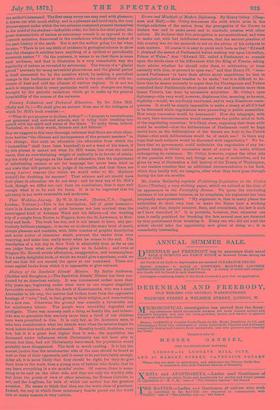Errors and Mischiefs of Modern Diplomacy. By Henry Ottley. (Chap-
man and Hall).—Mr. Ottley denounces the evils which arise in the foreign relations of the nation from the prerogative of the Crown to declare war and to make peace and to conclude treaties with other nations. He declares that this prerogative is unconstitutional, and tries to make out, with but indifferent success, that the ancient practice of this country was for the monarch to act on the advice of his subjects in such matters. Of course it is easy to quote such facts as that "Edward I. obtained the assent of Parliament before making war upon Llewellyn, Prince of Wales ;" that "Edward III. called a Parliament to consult upon the whole state of his differences with the King of France, asking their advice whether he should refer them to arbitration, or treat amicably with him, or proceed to open war ;" and that Henry IV. "sum- moned Parliament 'to have their advice about expeditions ho had in contemplation, and about treaties to be made," but it is difficult to be- lieve that he means seriously to argue that the Plantagenete and Tudors consulted their Parliaments about peace and war and treaties more than Queen Victoria has done by successive ministries. Mr. Ottley's open diplomacy—the very word, however, displeases him, meaning, as he says, duplicity—would, we are firmly convinced, end in very disastrous conse- quences. It would be simply impossible to make a treaty at all if it had to be discussed while negotiations were proceeding in publics assemblies. How every concession would be denounced ! How the telegraph, with its curt, bare announcements, would exasperate the public mind in both of the negotiating countries! Is it likely even, supposing that these evils could be avoided—that the deliberations of Parliament could be kept secret here, as the deliberations of the Senate are kept in the United States—that such deliberations would be of much use ? Is there any hope that such subjects would be discussed with impartiality ? We be- lieve that no government could undertake the negotiation of any im- portant treaty, in which concession must of course be made, without endangering its existence. Mr. Ottley, however, argues the other side of the question with force, and brings an array of authorities, and he gives by way of illustration a full history of the Treaty of Washington, if our readers consider that an additional recommendation to his book, which they hardly will, we imagine, after what they have gone through during the last six months.


































 Previous page
Previous page